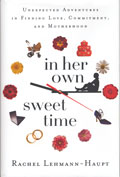Beyond "Baby Panic"
 For women who want to reproduce, the age of thirty-five has become notorious: the hang-time between "easy" fertility and what doctors call "geriatric" pregnancy. An estimated 20 percent of women wait until after thirty-five to have children, and every year their chances of getting pregnant drop. Forget the biological clock—for many women, this is the biological time-bomb.
For women who want to reproduce, the age of thirty-five has become notorious: the hang-time between "easy" fertility and what doctors call "geriatric" pregnancy. An estimated 20 percent of women wait until after thirty-five to have children, and every year their chances of getting pregnant drop. Forget the biological clock—for many women, this is the biological time-bomb.
Rachel Lehmann-Haupt '92 defuses this explosive subject in her heartfelt and informative memoir, In Her Own Sweet Time: Unexpected Adventures in Finding Love, Commitment, and Motherhood (Basic Books). Lehmann-Haupt's story mixes the poignantly personal with intensive science reporting. When the book begins, she's thirty-five, in her doctor's office. She's not in a relationship, but she knows she wants to have children, "Maybe next year. Or the year after that. Or even the year after that." She's worried about her declining fertility, and she wants to know what she can do about it.
Like many women, Lehmann-Haupt had spent her twenties working on her career, finding great satisfaction in writing for the New York Times, Vogue, and Newsweek, among other publications. Executive editor of Plum magazine, she lives in New York's West Village and travels the world on assignment. But hitting thirty-five forced her to face issues closer to home. "I wanted advice from someone within my generation who was going through everything I was, and am, going through myself," she writes in the book's introduction. Since she "couldn't find that book anywhere on the shelf," she decided to write it herself.
On her West Coast book tour in late June, Lehmann-Haupt and I met up at San Francisco's Serrano Hotel just before she gave a reading at Borders Books. As we sat in the hotel's Spanish revival lobby, perched over glasses of wine, Lehmann-Haupt exhibited a trait valuable to memoirists—the ability to contextualize one's most intimate experiences in a larger sphere.
—Traci Vogel
What inspired you to write In Her Own Sweet Time, and why write it as a memoir?
In 2004, when I was thirty-one, Sylvia Ann Hewlett, an economist, wrote a book that said basically that if you don't have a baby by the time you're thirty-five, you're doomed. The next year, my boyfriend and I broke up. I was very aware of my own age at that point, but the kind of "baby panic" reaction that was going through the media just seemed very simplistic.
I wanted to understand from a social-psychological perspective what it meant that more women were putting off having children until their thirties or forties, and what it meant for me. I couldn't see a way around using my own experience as a spine for the book, even when it was painful. I also had a lot of fun writing the book—there were some funny experiences, and I wanted to entertain people.
In the book, you explore some of the options available to women in your situation, and one of the things you decide to do is freeze your eggs. What did you learn about this option?
It's a fairly new technology, still considered experimental by the American Society for Reproductive Medicine, but it is becoming a way for women to extend their fertility. I do think eventually it'll be as influential as the birth control pill. If a woman knew that she didn't want to have a kid until age forty, she could freeze her eggs at twenty-seven, concentrate on her career, and when the time is right she'd have the option to use those eggs. I learned about it at an educational event for extended fertility, and flew to Italy and met the inventors of the technology. It's similar to in vitro fertilization—you give yourself shots and have your eggs removed under general anesthesia.
Why is the decision to have children so anxiety-producing for this generation of women in their thirties?
Women used to live their lives according to a social prescription: that we were supposed to be married by a certain age, we were supposed to be some cultural definition of a wife, and we were supposed to be mothers. Feminism questioned all of those roles. Liberated women had all of these new choices. The first wave, our moms, even though they were the warriors on the front, their consciousness-raising was more about sexual freedom—most of them were still getting married in their twenties and having children.
I think we are the first generation that is spending our twenties in a sort of second adolescence. We're getting married later, in our early thirties, and many women don't start thinking about getting pregnant until their mid-thirties. There really is no road map for us, which brings a whole new set of anxieties. What I'm really trying to do with the book is calm this panic. This combination of starting later and having a lot of new choices has forced our generation to ask questions that maybe we haven't had to ask in previous generations.
Did writing the book help allay your own anxieties?
This book has really been my life for the past six years, and, yes, it's an incredibly satisfying feeling to have expressed all of these emotions and to have put them into a story. That brings me to a place that is more at peace than I've ever been before. When I graduated from Kenyon, my mom said, "Find your passion, find yourself." I never interpreted that as what her mom said to her, which was, "Find a husband, get your MRS." I feel like I've found my passion, I've found my path.

 Delicious
Delicious Facebook
Facebook StumbleUpon
StumbleUpon Digg
Digg reddit
reddit